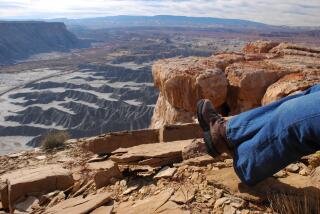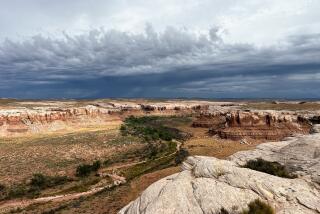Bush’s Dark Pages in Conservation History
SANTA FE, N.M. — A crucial struggle over land stewardship is taking place south of my home on the Greater Otero Mesa, a 1.2-million-acre stretch of grassland that looks pretty much the way it did when Coronado explored the region almost 500 years ago. As much as half of Otero Mesa still qualifies for protection under the landmark 1964 Wilderness Act, which was enacted when I headed the Interior Department under presidents Kennedy and Johnson. This law prevents industrial development on designated federal land “retaining its primeval character and influence.”
But the Bush administration, determined to ransack public lands for the last meager pockets of petroleum, has turned my old department into a servile, single-minded adjunct of the Energy Department. It is intent on opening Otero Mesa and other wild lands to oil and gas exploration under the guise of reducing our ever-growing dependency on imported oil.
Here in New Mexico, where citizens cherish sublime landscapes, the administration’s attack on the mesa is a heated issue. Gov. Bill Richardson has been joined by lawmakers, environmental groups and thousands of citizens in opposing drilling on Otero.
This crusade is part of a wave of public resentment across the West over the dark chapter that President Bush and his aides are writing in the history of the American conservation movement. From California to Colorado, Montana to Arizona, drill rigs pockmark the West’s wild places, licensed by a White House that views opening of the nation’s last untrammeled country to private development as a prime economic priority.
For the last 50 years as a congressman, as Interior secretary, as a citizen activist and a historian, I have been involved in the conservation cause. Until the last few years Americans have taken pride in the fact that our country has set the standard for innovative ideas about resource stewardship, and has seen them emulated throughout the world.
The word “conservation” -- and the concept of science-based management of resources -- did not exist until Teddy Roosevelt became president. He initiated the reforms and raised the banner, halting raids on the public’s resources and creating millions of acres of national forests, parks and wildlife refuges.
Even during the Great Depression, the second President Roosevelt enlarged his cousin’s legacy. FDR put people to work replanting forests, bringing electricity to rural areas and enlarging the nation’s national parks.
A third wave of conservation got underway in 1961 when Kennedy called for the establishment of wilderness reserves and the addition of seashores to the park system, inspiring conservationists to revive ideas that had been shelved after Pearl Harbor.
My office sorted through the results: Should I urge the New Jersey governor to oppose the powerful New York Port Authority’s plan for a super jetport in order to preserve the Great Swamp? Should I travel to Maine to help Sen. Edmund Muskie stop a dam that would flood the storied Allagash River? Could I persuade the budget people to spend $30 million more to prevent development inside the new Point Reyes National Seashore in California? We did all that, and more.
In those days, partisan lines were never drawn where conservation issues were concerned. Kennedy’s Wilderness bill passed the Senate by a vote of 78 to 12, with only six members of each party voting no. Republicans overwhelmingly voted for the bill largely because of the leadership of a farsighted Californian, Thomas Kuchel.
From 1961 to 1981, every president -- Kennedy, Johnson, Nixon, Ford and Carter -- gave his unwavering support to environmental reforms. Richard Nixon set a high goal by declaring that the 1970s should be the “environmental decade.” He created the Environmental Protection Agency and approved laws to protect endangered species.
As the country moved rightward with Reagan, the rhetoric may have been negative, but in the end no effort was made to repeal important environmental laws. George H.W. Bush had a positive record, and although Bill Clinton was stymied by a hostile Congress, he used his executive powers to achieve positive results.
Overall, it’s a record that bolsters my thesis that this administration is rowing against the tide of American history. Otero Mesa symbolizes its narrow focus. Bush and company have not put forward a single positive new conservation concept. They have systematically lowered pollution regulations to please favored industries. They have allowed park and forest maintenance to be neglected and under-funded. I view these events and developments with dismay. This is a time for straight talk, for those who love the land to make their voices heard before more damage is done to the resources we all own.
More to Read
Sign up for Essential California
The most important California stories and recommendations in your inbox every morning.
You may occasionally receive promotional content from the Los Angeles Times.










